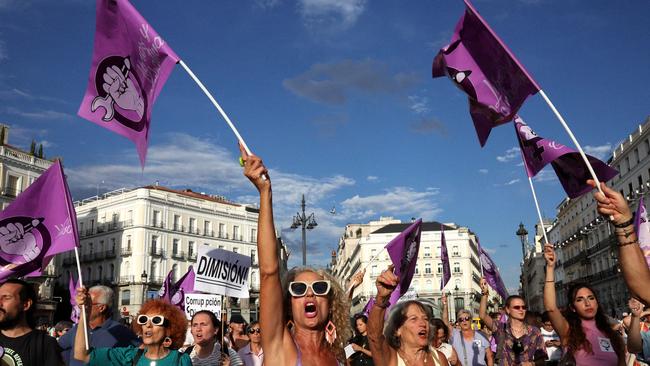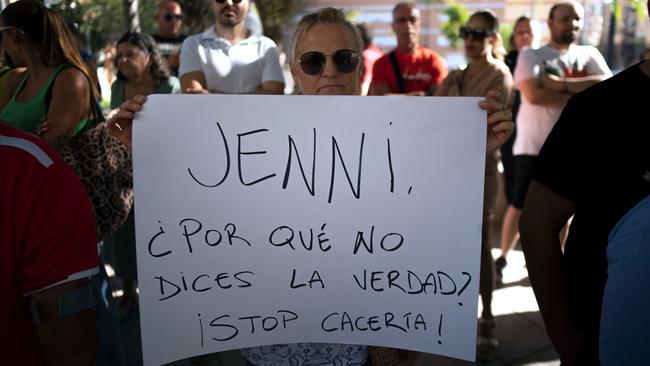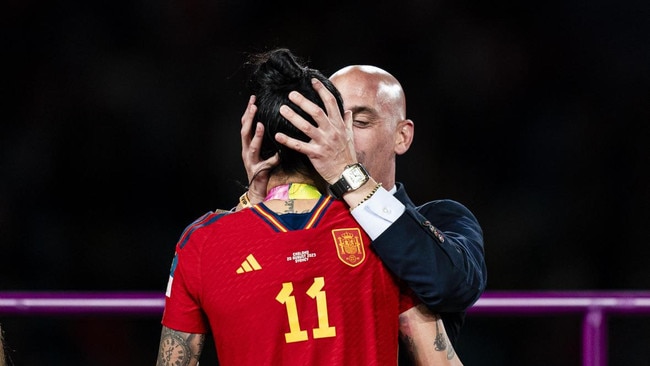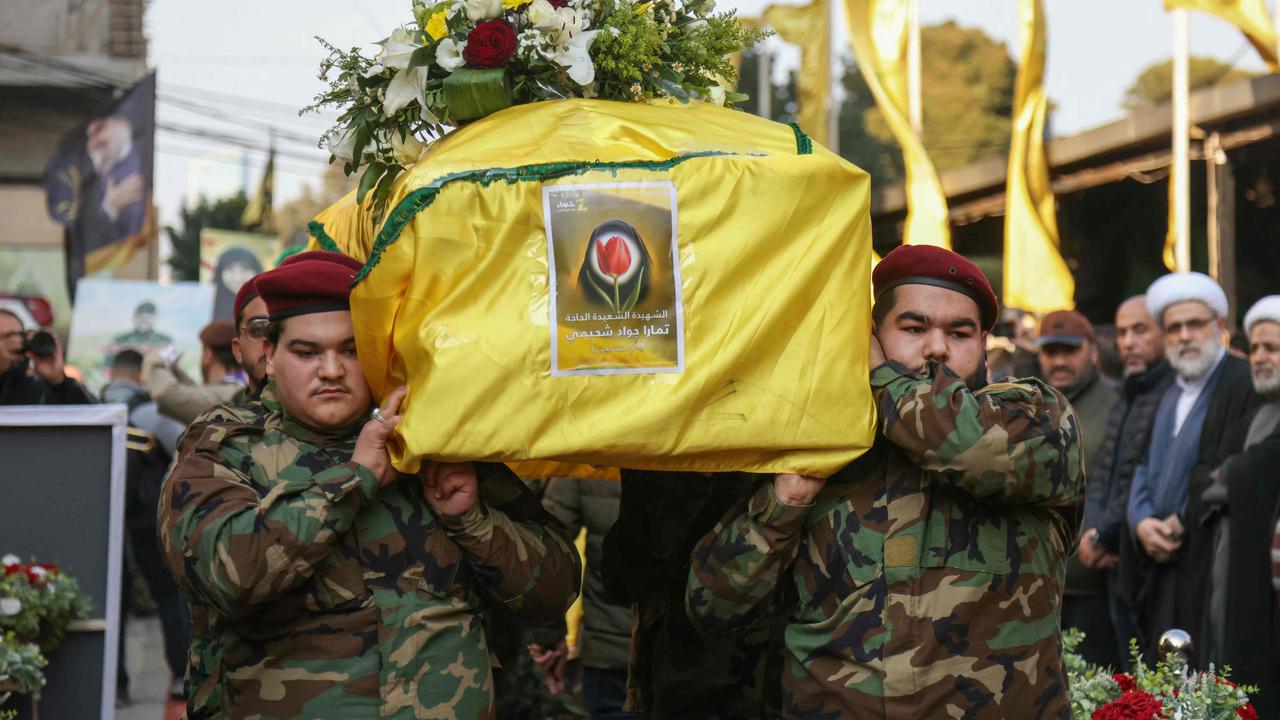Kiss puts nation on verge of nervous breakdown
Two weeks after an unsolicited kiss at the women’s World Cup final, Spain remains gripped by a growing row over gender inequality.

A few elderly parishioners had gathered in their southern Spanish town on Friday evening to hear Father Jose say Mass at the Divine Shepherd church. Noting the number of conflicts in the world, from the war in Ukraine to the fighting in Syria, the priest urged them to pray for peace.
Down the road, though, his own compatriots were at each other’s throats. In the main square of Motril on the Costa del Sol, I had just watched young men hurling abuse at feminist protesters. The women replied with chants of “fascists and machistas (sexists) out”.
During the civil war in the 1930s at least one priest from Motril is thought to have been executed. Last week the seaside town, best known until recently for its paper mill and greenhouse agriculture, found itself on the front line in another conflict: the Spanish sexism war.
The drama began on Monday, when Angeles Bejar, 70, a retired hairdresser, locked herself inside the church and said she was going on a hunger strike in protest over an “inhumane witch-hunt” against her 46-year-old son, Luis Rubiales, the president of the Spanish football association.
Rubiales grew up in Motril and became arguably its most infamous son after his actions following Spain’s 1-0 victory over England in the Women’s World Cup final in Sydney on August 20.

Rubiales, a former footballer, seized Jenni Hermoso, one of the winning players, by the head to pull her towards him and kiss her on the lips while medals were being handed out.
At first he dismissed his critics as “idiots”. Then he apologised but said the kiss was consensual. Hermoso denied this and said that she “felt vulnerable and a victim of an impulse-driven, sexist, out-of-place act without any consent on my part”. She has also said that she felt pressure to publicly play down the incident.
Two weeks on, the outrage shows no sign of abating, particularly after Friday’s ruling by Spain’s sports council that Rubiales had committed a “serious offence” – but not serious enough to suspend him from his $1.2m-a-year job.
As news of the ruling emerged, dozens of women who had already gathered for a protest in Motril’s main square next to a giant honeysuckle bush began to chant, “Rubiales resign” and, “If you touch one of us, you touch us all”. Young men on the edge of the throng began shouting “viva Rubiales” and “go home, feminist shit”. Police intervened to prevent two men exchanging blows.
FIFA, football’s world governing body, has suspended Rubiales – or “Rubi” to fans in his home town – for three months. More than 80 Spanish players, including the women’s team, who are due to play against Sweden on September 22, have said they will not represent their country unless he gives up the presidency.
On Sunday, though, he was clinging to the post, apparently unrepentant. Instead of an aggressor, he said he was the victim of an “unprecedented political and media lynching”. It was reported that, although still in the job, the divorced father of three had been asked to return a company car and mobile phone.
Bejar said she was praying for her son when she began her hunger strike with an announcement that she would consume only isotonic drinks. By Wednesday, with the press camped outside the gates, she was reported to have fallen ill. What happened next caught waiting cameramen by surprise. She was spirited out of the church, apparently through a side exit, to be taken to hospital for tests. The next day she was released into the care of her son, who had raced to her bedside.
This extraordinary train of events might have been scripted by Pedro Almodovar, the Spanish master of cinematic melodrama.

Hermoso has yet to file an official complaint about the kiss, or “peck”, as Rubiales called it. But prosecutors at Spain’s top criminal court said on Monday they had opened a preliminary investigation on the grounds that it could constitute “sexual aggression”.
For some commentators, Rubiales’s oafish behaviour demonstrated just how machista Spain still is, a view reinforced by grim statistics about domestic violence. Murders of women by boyfriends or husbands have risen dramatically over the summer. The Spanish ministry of equality says that 19 women have died at the hands of partners since June – and 40 this year. The surge in domestic violence prompted Equality Minister Irene Montero to schedule a “crisis meeting” on Monday “to see how we can improve the institutional response”.
Yet Spain may not be the worst offender in Europe. It has fewer incidences of physical or sexual violence against women than Denmark and Finland, according to surveys, although this may reflect the fact that it is more culturally acceptable in Scandinavian countries to talk about violence in couples.
In a further demonstration of Spain’s divided attitudes to gender violence, on Friday Getafe signed on loan the Manchester United striker Mason Greenwood who has not played since he was charged with attempted rape, controlling and coercive behaviour and assault in October last year. The charges were dropped in February.
Following an internal investigation and external pressure, including from domestic violence campaigners, last month United announced that he would rebuild his career elsewhere. Greenwood, 21, had denied all charges.
Whatever its image as a bastion of machismo, Spain has taken leaps forward since the days of General Franco, when women were largely confined to the home and suffered abuses without laws to protect them.

The latest gender gap survey from the World Economic Forum ranks Spain as the 18th most equal country, just below the UK but above Canada, Australia, France and the United States.
Women are conquering Spanish politics: Socialist prime minister Pedro Sanchez has stuffed his cabinet with women. Three are deputy prime ministers, in charge of the economy, employment and environment. Other portfolios held by women include defence and justice.
This political advance is not only on the left. The most potent force on the right, according to polls, is Isabel Diaz Ayuso, conservative president of the Madrid region. She has joined government figures in urging Rubiales to resign. Yet some I met in Motril believed the fuss over Rubiales had gone too far.
“Soon we won’t even be able to say ‘hola’ without getting into trouble,” said Paco Gonzalez, 63, as he watched the rally on Friday. “[Rubiales] may have behaved like an idiot, but the kiss was a result of euphoria after the victory.”
A driver at the local paper factory who claimed to know Rubiales and did not want to be named said: “They’re crucifying that poor man. It’s ridiculous to call a kiss like that a sexual aggression. Of course . . . he should have controlled himself, and, if he couldn’t, he should do a course to learn how.”
Some women also expressed sympathy. “It was a moment of great emotion, he shouldn’t resign for that,” said Marie Carmen, 50, who works in a giant greenhouse producing tomatoes.
Whether Rubiales resigns or is forced to step down, the truth is that, much as it has turned its back on the medieval Franco decades, old habits die hard in Spain. Last week San Luis de Albondon, a village near Granada, came under attack over the prizes it handed out in its summer fiesta: men got a bottle of alcohol while the women got cleaning cloths.
A few years ago, a nationwide association for gender equality began holding meetings in which men were encouraged to discuss their sexist prejudices - and overcome them. As Miguel Lazaro of the Men’s Association for Sexual Equality put it: “Every man is in need of an internal revolution.” For the time being, the country seems more divided than ever.
THE SUNDAY TIMES


